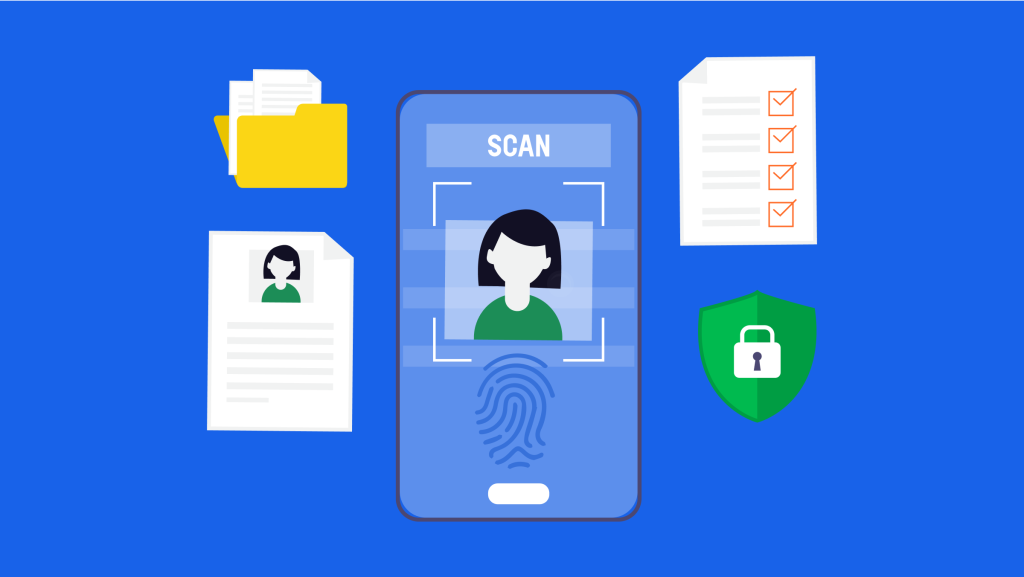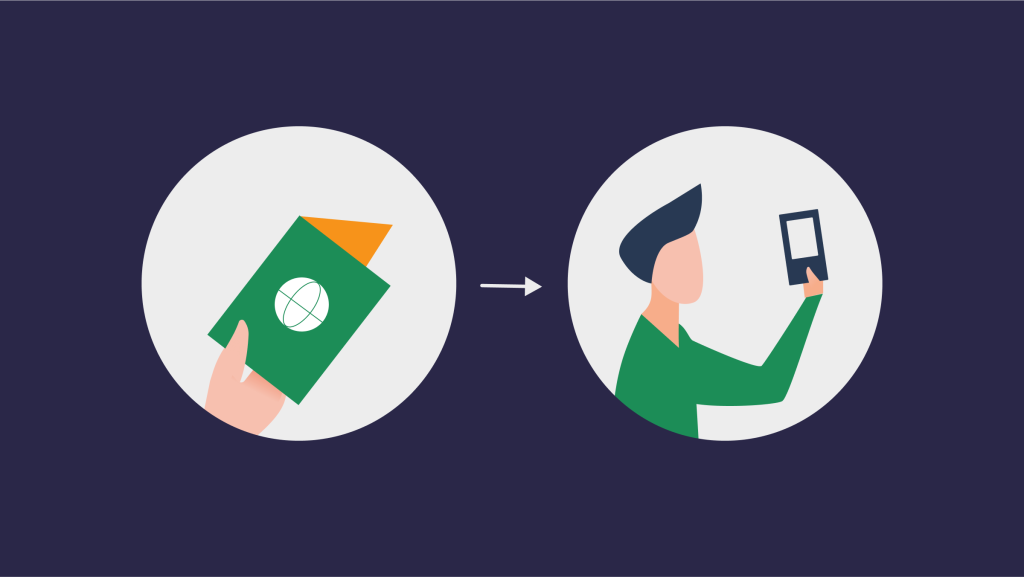What Does KYC Mean in Crypto?

Security is the most important part of every cryptocurrency transaction. Unlike traditional banking, KYC crypto exchanges can rely only on safety protocols implied by their policies. While the security of the cryptocurrency exchange platforms is one thing, the whole other thing is the safety of using this money.
Most of the online frauds tied with finances are issues caused by anonymity and free access to crypto currencies. And while anonymous transactions still exist, many big exchanges take their steps in establishing safety measures that prevent financial offenses. One of these measures is KYC crypto user authentication ‒ the safest and the most efficient means to verify a user’s identity without the tiring bureaucracy involved.
What does KYC stand for?
If you ever wondered what is KYC in crypto, or what is KYC meaning for crypto exchanges, we’ve got you covered. KYC is actually a short version of the Know-Your-Customer verification process that can be launched by a company to verify a user’s identity. This can be done either right after signing up on the exchange website or before any financial operation can be made. KYC meaning crypto operations get advanced safety optimizes the digital financial environment.
The process of the KYC verification allows the company to check the identity of their client and see if their persona is tied to any illegal financial transactions or actions in the past. For a company, this is the only way to protect themselves from being involved in corruption schemes and other illegal activities. For customers, this is the best way to secure their funds and work with them in a safe and legally protected way. Also, you won’t be able to deposit or withdraw funds without verifying your identity — luckily, the process is quite easy.
But first of all, let’s clarify why exactly we need to verify your identity, as KYC in crypto becomes a mandatory practice.
The KYC verification systems are a huge part of the fight against financial offenses and other illegal activities that involve crypto. The world around us is (sadly) not perfect, and we as a company that works with crypto exchanges must prevent situations where we can be involved in such activities. That means that we have to take into account some safety measures, including identity verification. When we run it, we can see if the account was created for a real person and if they were ever spotted with suspicious financial activities. For regular people that want to exchange some fiat for crypto and use it for their needs, this process is not even a bother – 5 minutes and you’re safe to do what you want to do with this money.
Basically, KYC verification is a background check run by the company to make sure that the client won’t use their crypto services with illegal intentions. This preventive measure is an important process that works for positive changes in a global AML (anti-money laundering) and CFT landscape.
While KYC authentication is an easy process to go through, there are a few levels of it depending on what policy that an exchanges platform runs under. These levels differ in how strict they are – this heavily impacts the amount of information you need to provide the company with. The info on these types of KYC checks can get confusing – too many websites provide contradicting data. The classification below is our best attempt to gather all known info on these levels and categorize it.
CIP (Customer Identification Program)
This one is a no-brainer: the program collects identity-related information about the customer to tie it with the account. CIP is a base level – most crypto exchanges use it to make sure there’s a real person behind an account. Some extend their KYC verification to the next levels, and some do a full-stop here.
Due Diligence
Now, this is where things get really serious and the identity of the client gets a thorough background check.
These checks are common both for crypto exchanges and for fiat banking institutions. The only information that gets collected and checked is financial records: debts, credits, and anything related.
To go through this process, you don’t have to do anything past level 1 – the system scans everything on its own. If anything in your financial history is unclear, there’s a chance that your account will get marked as suspicious and will also get extra attention during crypto transactions.
Ongoing monitoring
Being exactly what it says on the title, this type of KYC includes continuous monitoring of customers’ activity with fiat and crypto – even more thoroughly for those who have been flagged as suspicious during the second-level check.
If a customer is about to do something suspicious with crypto or fiat currencies (we’re talking “sending big amounts of money to accounts tied with illicit activities” type of suspicious), this operation will be investigated and the account will get frozen.
And again, not all crypto exchanges platforms use all three levels of KYC. The entry level where you have to prove you’re real&legal is a must for every serious service that doesn’t want to mess with its clients. What happens next is usually not spelled – the information you give is enough to run the next KYC checks.

How does KYC check work?
The main practical point of the KYC process is to verify whether the client is a person they claim to be or not. If yes, they will be given access to requested services, and if not, they will be denied. The KYC process can be executed in many ways ‒ there’s no exact method required. Some services use video calls, and some ask to provide them with ID or any other government-issued identity-confirming document. Some banking institutions require an offline visit to their office to confirm client identity. But, we’re talking about crypto services here, so let’s see how we do that here at P2B.
We need only one document of your choice: it can be your driver’s license, your ID card, or a passport. Take a pic of it ‒ we need high-quality images for each side of the document. If you want to verify your identity with your passport, we’ll only need a picture of the biodata page.
The next step comes with a selfie ‒ make sure your frontal camera is clean and the image is not blurred. You need to take a selfie with the document you submitted and with the sheet of paper with “P2PB2B.com” and the current date written on it.
That’s pretty much it ‒ the next steps are on us. We will search for a confirmation of the authenticity of the documents and other information you provided us with. KYC crypto protection basically runs on multiple automated algorithms.
We also state in our KYC policy that we have the right to investigate some users who were flagged as suspicious. Don’t worry ‒ the system determines these people pretty accurately, so if you have nothing to hide, then you have nothing to worry about.
Also, there are some important things about your identity-associated information that you need to know from us. First of all, we collect, store, and protect all that data under our Privacy Police regulations. This document governs how exactly and on what terms your data is stored, so if you’re worried that we’ll share it with third parties, go check it out on our “Privacy Policy” page.
You also need to know that we run checks through sanction lists and watch lists to make sure that people from these lists won’t be able to violate restrictions laid on them through our services.
Can you buy crypto without KYC verification?
This is an interesting thing to talk about, as you probably have seen some crypto exchanges, including P2B, that are working without KYC checks. Here you can buy crypto without KYC or any verification ‒ that can be understood if you wish to operate with small amounts of crypto coins. No KYC crypto exchanges are a thing that is hard to ignore.
Basically, non-KYC crypto exchanges are decentralized, meaning buyers and sellers create peer-to-peer transactions to sell or buy coins for fiat or crypto. You can either create an offer to buy the exact amount of coins you want for your own price and with your preferred payment method, or browse what sellers offer and choose the offer that meets your requirements.
When you meet a peer that matches your preferences, you can buy or sell crypto on these terms. This sounds like since the exchanges platform has no involvement whatsoever, many scammers might take an opportunity to steal money, but no: platforms use scam-preventing methods such as arbitration and security deposits. Is it still a decentralization though? Yes, because the platform is there only to connect buyers with sellers, not to be a trader.
Though yes, you can buy your coins anonymously using the decentralization feature of some crypto exchanges without KYC, it’s not that easy. You have to spend some time browsing through tons of sellers to find the one that meets your terms on a price, amount, and payment method. Price is the first stop where you can think of switching to a centralized platform instead. The thing is, a lot of sellers make their prices higher on purpose ‒ we can call it “decentralization benefits”. Sellers know that not going through a KYC check is more or less a privilege, so they’re comfy with setting their prices a bit higher.
This practice for a while was the most common when it came to buying crypto. These days, though, everything is getting more centralized ‒ it almost feels like the main point of crypto economics ‒ the decentralization ‒ is dismissed. That’s an interesting controversy: KYC is a safe but also centralized way to trade coins while decentralized platforms offer to trade in the traditional anonymized manner. So, where’s the truth?
Centralized crypto platforms need KYC to make sure their services fall under the laws of the countries where they’re registered. For this reason withdrawals from P2B that are more than 1000 USD per day are available only for verified users. On the other hand, decentralized platforms allow you to remain anonymous and not share your personal information. In a perfect world, they’re a perfect solution for crypto trading. But we live in a reality where people abuse anonymity to commit or cover their illegal activity. And if someone gets scammed, there’s no realistic way to trace the person who did it to them ‒ this is an issue as well.
KYC checks provide both companies and their clients with security and accountability for their actions. Of course, the initial philosophy behind the cryptocurrency gets sacrificed for safety benefits, government-based regulation laws are being accepted all over the world, so KYC is kind of a sign of the times.
Another thing that might get people concerned about KYC is information safety. News about sensitive data leaks appears not as rare as everyone would wish. Unfortunately, there are no specific regulations about security measures for crypto operations, but there are also a lot of companies that treat security seriously. With P2B, your personal data is safe and encrypted on our servers. You can read more on that on our Privacy Policy page.
The reason KYC is now mandatory for most crypto exchanges
The first reason why exchanges do that is to minimize the risks. KYC verifications prevent fraud and lawsuits revolving around illicit financial schemes ‒ no one wants to be a part of this mess.
Other benefits of KYC verification include:
- complying with financial laws and regulations of most countries ‒ especially the ones where these companies are registered;
- cutting down the number of prohibited activities associated with these currencies while also flagging suspicious behavior to prevent financial offenses;
- ensuring safe and transparent transactions where both parties participating in exchanges, as well as the platform, get their fair profit.
There are many scam cases with both crypto and fiat currencies ‒ the only difference is that fiat currencies transactions can be easily tracked and canceled, while with crypto it’s not that easy without KYC. Platforms that ask you to go through the KYC verification process have the main purpose to protect your funds and their good name, so this is your best option if you want your transactions to be safe.
Benefits of KYC verification on P2B
We use probably the most advanced AI technologies and powerful optimization tools to make this process fast & easy for you. In a few minutes that this process takes, you’ll get full access to all of our services securely.
And when we say it’s easy for you, we really mean it ‒ the numbers will explain it all:
- you need only 1 document of your own choice;
- the process will take 3 minutes of your time at most;
- your account will be verified in no more than 5 minutes.
After you pass the KYC verification, you can enjoy our services to the fullest, including withdrawing more than 1000 USD per 24 hours.
Final thoughts
For many (probably for most of) platforms associated with crypto, KYC is a necessary if not mandatory process to comply with AML requirements. Using this security method, we can create a safer environment for every trader and crypto-related business to prosper.
Join P2B now to experience the best of crypto trading opportunities and grow your business ‒ we will make sure you can do it safely!




